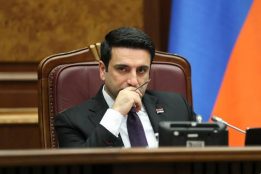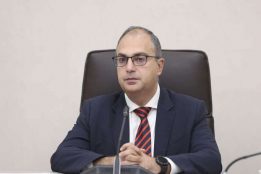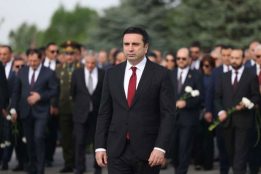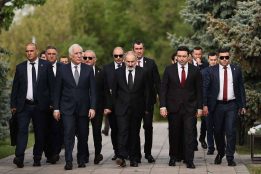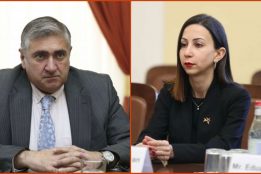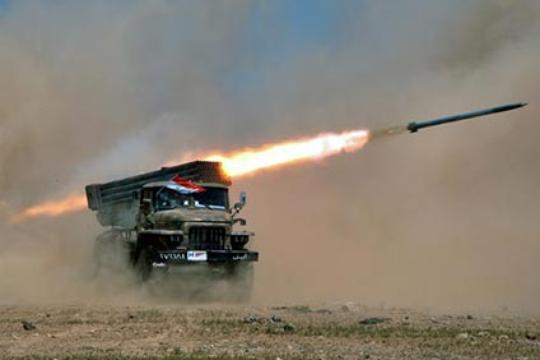
Paul B. Stares, General John W. Vessey Senior Fellow for Conflict Prevention and Director of the Center for Preventive Action, touched upon the use of chemical weapons in Syria. Find the article below.
Warnings by the United States and other countries threatening the Syrian regime with dire consequences if chemical weapons are used against rebel forces may have had the intended effect. Recent media reports suggest this concern has now diminished. It is just as plausible, however, that the regime had little intention of using its chemical weapons but fabricated the preparations that prompted the warnings to deter outside intervention in Syria’s civil war.
Either way, it is wrong to assume the danger of chemical weapons use in Syria is receding. Indeed, there are good reasons to believe it could grow in the coming weeks and months.
Syria, which is not a signatory of the Chemical Weapons Convention, is widely believed to possess sizeable stocks of different kinds of chemical weapons (CRS)–principally nerve (Sarin, VX) and blister (mustard gas) agents–that have been weaponized into bombs, artillery shells, and possibly warheads for delivery by missiles. How quickly this arsenal could be employed today is unclear from public reports, but it is prudent to believe that some, if not all of it, is operationally ready. Although the fighting to date has more than demonstrated the lethality of conventional weapons, the use of chemical agents would represent a significant escalation of the violence with potentially mass casualty consequences. It would also breach an international norm against the use of chemical weapons that is important to maintain.
Deliberate use of chemical weapons by government forces against either rebel groups or population centers considered sympathetic to their cause is certainly the scenario that has attracted the most concern. But it is just one of many conceivable scenarios to worry about.
For example, should rebel forces progressively gain the upper hand–as they seem to be doing–the regime or elements of the regime might retreat to predominantly Alawite areas of Syria to create a rump state. Chemical weapons could eventually be employed to deter further encroachment or defend these areas when they are assaulted. And if defeat looked inevitable, their use as a final act of defiance cannot be discounted.
Leaky Weapons
The United States and its international partners cannot assume, moreover, that they know of all the chemical weapons storage sites in Syria or that the movement of munitions from the known ones will be detected in a timely manner. Some may already have been secreted away by the regime as Muammar el-Qaddafi reportedly did after Libya had agreed to destroy its stockpile of chemical weapons.
Maintaining tight command and control over units and personnel with access to chemical weapons will also become increasingly difficult as the regime collapses. For those in the field, any ambiguity about who is in charge and in the chain of command heightens the prospect of unauthorized use. Whether there is some pre-delegated authority to use these weapons under certain circumstances is also something be concerned about.
Another set of worrisome contingencies involve the capture and potential use of chemical weapons stocks by rebel forces. It is not hard to imagine how, in the heat of battle, chemical weapons could be turned against government forces or used in retribution for past atrocities. Some might even see their use as a way to trigger outside intervention. Other wildcard possibilities involve terrorist groups like Hezbollah acquiring chemical weapons in various ways as the Syrian regime crumbles.
Preventing these various threats from materializing clearly represents a much harder challenge than issuing warnings to the Syrian government. A broader, more nuanced strategy is required.
Though not conceived with potential chemical weapons use in mind, the elements of such a strategy can be found in the final report of the Genocide Prevention Task Force, co-chaired by former U.S. secretary of state Madeleine Albright and former U.S. secretary of defense William Cohen. Their report advocated targeting each of the principal groups in any given atrocity situation with a tailored set of preventive measures.
Preventive Steps
In the context of Syria, these target groups would be: those in a position to authorize the use of chemical weapons; those in physical control of them and able to execute orders; the potential victims of their use; and various third parties. The following measures should be considered by the principal international actors concerned by the potential use or loss of chemical weapons in Syria:
Warnings. In the event the Assad regime begins to unravel, U.S. officials as well as leading North Atlantic Treaty Organization allies and the United Nations secretary-general can reiterate public warnings of the consequences of using chemical weapons and, moreover, bolster these with more explicit threats. These can also be complemented with private messaging to leading figures in the regime that underscores the general warnings with more specific threats of punitive action, including likely criminal indictment.
Securing loose weapons. Known representatives of rebel groups operating in Syria can be given instructions about securing, if not disabling, chemical weapons stocks that fall into their possession while also being warned of the consequences should their fighters use them. At the same time, consideration should be given to offering inducements, including financial rewards, to rebel forces for supporting this effort. Governments known to be backing other groups with weapons and financial assistance can also be tapped to transmit the same message. These governments could likewise be warned of potential penalties if their proxies use chemical weapons.
Information warfare. To the extent that government units guarding or capable of using chemical weapons can be identified, these too can be the target of a discrete information warfare campaign. This could include television and radio broadcasts, email messaging (as was apparently used by U.S. forces in the lead up to the invasion of Iraq in 2003), and leafleting known storage sites in a collective effort to dissuade military personnel from using chemical weapons. Again, the messaging can be a mixture of positive and negative inducements to elicit cooperation.
Military strikes. Military options to deny or preempt the use of chemical weapons by any actor can be readied for rapid execution on receipt of compelling early warning. These range from the use of air strikes (including drones) and special operations forces to cyberattacks. Rebel groups in the vicinity of an expected attack might conceivably be employed to interdict use. Each of these options has different operational implications in terms of speed of use, potential effectiveness, and placing U.S. service personnel in harm’s way.
Surviving an attack. Unless there is accurate forewarning of intentions and preparations to use chemical weapons, the options to help vulnerable populations either avoid or survive an attack are limited. Some basic survival information could conceivably be transmitted to rebel groups to disseminate among local communities. Warnings might also be broadcast through various channels to specific areas deemed at risk but the potential unintended consequence of this could be to instigate mass panic that makes the situation worse.
Third party interventions. In addition to rebel supporters, there are several critical third parties that can be used to reinforce messaging on chemical weapons by the United States and others. This includes those with long-standing contacts with the Syrian regime (Russia and Iran), and Hezbollah (Iran).Other neighboring countries can be supported to improve their border security against the possible transfer of chemical weapons. And finally, various UN bodies and regional organizations in the Middle East can be encouraged to stress concerns already expressed by the UN secretary-general.
Collectively, these efforts would not preclude the use of chemical weapons in Syria, but they would lessen the risk. Moreover, they should not be a substitute for additional measures in the event these preventive efforts fail. These include additional diplomatic initiatives and potential military measures to disrupt or deter further chemical weapons use in Syria, as well as humanitarian assistance to help affected areas and respond to the possibility of large-scale refugee flows.

















